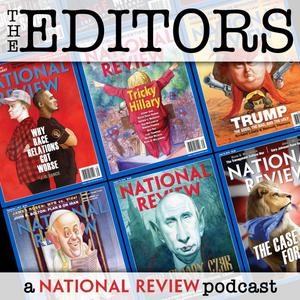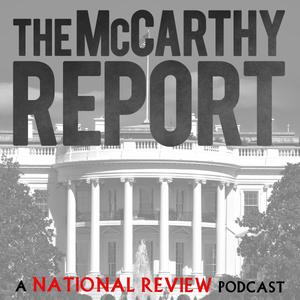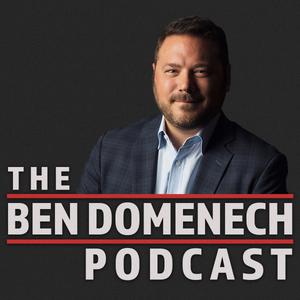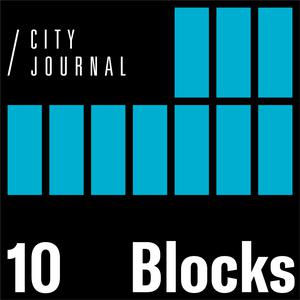
What the Hell Is Going On
American Enterprise Institute
Get the latest from Pletka and Thiessen
- 36 minutes 59 secondsWTH Extra! Who Gets Ukraine’s $26 Trillion In Gas and Minerals? Dany and Marc Discuss
In this episode of WTH Extra! Dany and Marc discuss Marc’s column in the Washington Post, Does Trump want Putin to get Ukraine’s $26 trillion in gas and minerals? Ukraine is a mineral superpower, with some of the largest reserves of 117 of the 120 most widely used minerals in the world. And with the help of U.S. assistance, Ukraine has successfully defended roughly 80 percent of its known mineral deposits. If the U.S. continues to help Ukraine secure and develop its natural minerals, we can not only deal a strategic blow to Beijing and Moscow, but also bring enormous financial benefits back to the American people.
Read Marc's article in the Washington Post here.
Read the transcript here.
Subscribe to our Substack here.
23 December 2024, 11:00 am - 50 minutes 27 secondsWTH Do Americans Not Trust Experts? AEI President Robert Doar Explains
Americans have lost faith in the expert class, and in some cases, for good reason. So-called “experts” didn’t just destroy livelihoods during the COVID pandemic or make China rich through normalized trade relations, they also looked down upon and antagonized the American people in the process. What role will experts play in the second Trump administration? And how can the expert class begin to regain the trust of the American people?
Robert Doar is the president of the American Enterprise Institute. While at AEI, Mr. Doar has served as a co-chair of the National Commission on Hunger and as a lead member of the AEI-Brookings Working Group on Poverty and Opportunity. He first joined AEI in 2014 to lead the Institute’s opportunity and mobility studies program after serving for more than 20 years in leadership positions in the social service programs of New York State and New York City. He is the host of the podcast One on One with Robert Doar.
Read the transcript here.
Subscribe to our Substack here.
19 December 2024, 11:00 am - 1 hour 10 minutesWTH is Going On In Syria? The New Lines Institute’s Hassan Hassan Explains
In roughly ten days, opposition forces in Syria were able to accomplish more than they did in a decade and topple the tyrannical Assad regime. But as the dust settles, Hay’at Tahrir al-Sham – the U.S. designated terrorist organization that led the march to Damascus – will have to prove that it has moved on from its anti-Western Jihadist ideology and is committed to rebuilding a Syrian state that meets the needs of its people. Why did Assad’s regime collapse so quickly? And what does the future of Syrian governance look like?
Hassan Hassan is the Founder and Editor-in-Chief of New Lines Magazine, an initiative of the New Lines Institute, and the founder of the institute’s Human Security Unit. Previously, he was a Senior Fellow at the Program on Extremism at George Washington University and the Tahrir Institute for Middle East Policy. He is the co-author of the New York Times bestseller ISIS: Inside the Army of Terror (2016, Reagan Arts).
Read the transcript here.
Subscribe to our Substack here.
10 December 2024, 11:00 am - 47 minutes 49 secondsWTH: Biden Pardons Hunter! Professor Jonathan Turley Explains
After repeatedly pledging to the American people that he would not pardon his son Hunter, Joe Biden gave his son one of the most sweeping pardons in presidential history. The presidential pardon power has a long history of abuse, but never before has a pardon been so broad, over such a long period of time, and issued by someone possibly implicated in the case. Why did Biden choose to pardon his son now? And what does the pardon mean for the future of political lawfare?
Jonathan Turley is the Shapiro Professor of Public Interest Law at George Washington University. At GWU, he is also the Director of the Environmental Law Advocacy Center, and Executive Director of the Project for Older Prisoners. Professor Turley has served as counsel in some of the most notable cases in the last two decades including the representation of whistleblowers, military personnel, judges, and members of Congress, and has testified before Congress over 100 times. His latest book is The Indispensable Right: Free Speech in an Age of Rage (Simon and Schuster, 2024).
Read the transcript here.
Subscribe to our substack here.
Find The Indispensable Right here.
6 December 2024, 11:00 am - 47 minutes 46 secondsWTH Extra! Martial Law in South Korea? Zack Cooper Explains
Late Tuesday night South Korean President Yoon Suk Yeol declared martial law, accusing the opposition party of “legislative dictatorship” and vowing to eradicate “pro-North Korean anti-state forces.” Almost as suddenly as martial law was declared, the legislature voted unanimously for it to end – sending the very military forces that attempted to lock down the National Assembly packing. What do Yoon’s actions mean for the future of South Korean politics? How might a collapse of South Korea’s conservative party affect U.S.-Korean relations? And what are the broader implications for American allies and partners in Asia?
Zack Cooper is a senior fellow at the American Enterprise Institute, where he studies US strategy in Asia, including alliance dynamics and U.S.-China competition. He also teaches at Princeton University and serves as chair of the board of the Open Technology Fund. Zack previously served as the assistant to the deputy national security adviser for combating terrorism at the National Security Council and as a special assistant to the principal deputy undersecretary of defense for policy at the Department of Defense. His upcoming book is Tides of Fortune: The Rise and Decline of Great Militaries (Yale University Press, 2025).
Read the transcript here.
Subscribe to our Substack here.
5 December 2024, 11:00 am - 54 minutesWTH is Going On With the World’s Looming Depopulation Crisis? Nicholas Eberstadt Explains
For the first time since the Black Death in the 1300s, the world is heading towards an era of depopulation. And for the first time in human history, this era of depopulation will be by choice. All over the world, women are choosing to have fewer and fewer children even as medical advances continue to prolong life. The result will be that people born today will live in graying societies in which the elderly and retired vastly outnumber the young and employed who are critical in supporting older generations. Why are people around the world choosing to have fewer children? And what do graying societies mean for the global economy?
Nicholas Eberstadt is the Henry Wendt Chair in Political Economy at the American Enterprise Institute where he researched demographics, economic development, and international security in the Korean peninsula and Asia. He is also a senior advisor to the National Bureau of Asian Research, a founding board member of the US Committee on Human Rights in North Korea, and has served as a consultant or adviser to the US Government and international organizations. His most recent book is the Post-Pandemic Edition of Men Without Work (Templeton, 2022).
Read the transcript here.
Read Eberstadt's Foreign Affairs article here.
Subscribe to our substack here.
27 November 2024, 11:00 am - 1 hour 5 minutesWTH is Trump Trying to Recess Appoint Cabinet Members? John Yoo Explains
Many of President-elect Donald Trump’s announced cabinet nominees are well respected and will likely have an easy path to Senate approval. Others, not so much. So Trump has proposed doing something no president has ever done before: Skirting the Senate approval process altogether via recess appointments. This appointment scheme delegitimizes Trump’s cabinet picks, sets a dangerous precedent for future administrations, and is likely unconstitutional.
John Yoo is the Emanuel Heller Professor of Law at the University of California at Berkeley, a Nonresident Senior Fellow at the American Enterprise Institute, and a Visiting Fellow at the Hoover Institution and Stanford University. Yoo was a law clerk for Supreme Court Justice Clarence Thomas, the general council of the Senate Judiciary Committee, and the former head of the Office of Legal Counsel in the Justice Department. His most recent book is The Politically Incorrect Guide to the Supreme Court (Regnery, 2023) with Robert Delahunty.
Read the transcript here.
Subscribe to our Substack here.
21 November 2024, 11:00 am - 57 minutes 52 secondsWTH Should Democrats Learn from Trump's Victory? Ruy Teixeira Explains
President Donald Trump made gains among nearly every single demographic group in his historic victory, particularly with Hispanic and young voters. As the Democratic Party asks itself how it lost to Trump – a man they cast as a dictatorial threat to Democracy itself – it will have to look inward and realize it has moved from being the “party of the kitchen table” to the “party of the faculty lounge.” Working middle-class voters don’t identify with a party that spends more time criticizing anyone who disagrees with them as bigoted than working to make peoples’ lives better. Will Democratic leaders learn from their mistakes and move to the center on cultural issues? Or will the Democrats continue to pander to their progressive base?
Ruy Teixeira is a nonresident senior fellow at the American Enterprise Institute, where he focuses on the transformation of party coalitions and the future of American electoral politics. Before joining AEI, he was a senior fellow at the Center for American Progress. Teixeira is co-founder of the Liberal Patriot Substack and co-author of the books The Emerging Democratic Majority (Scribner, 2002) and Where Have All the Democrats Gone? The Soul of the Party in the Age of Extremes (Henry Holt & Company, 2023).
Read the transcript here.
Subscribe to our Substack here.
14 November 2024, 11:00 am - 34 minutes 44 secondsWTH Extra! Trump Wins! Dany and Marc Discuss
For the first time since 1892, a former president has regained the office he lost. President. In a landslide victory, Donald Trump won an extremely diverse coalition worried about the state of America’s economy and southern border. The Democratic Party, meanwhile, lost ignominiously and will have some soul-searching to do in the wake of failed identity politics and attempts to cast Trump and his supporters as a threat to American ideals. Who are the voters that drove Trump to victory? How might Trump’s second term differ from his first? And what can American leaders on both sides do right now to unite the country?
Subscribe to our Substack here.
7 November 2024, 11:00 am - 1 hour 1 minuteWTH: Does Trump Support Legal Immigration? Ramesh Ponnuru and Michael Strain Debate
President Donald Trump has routinely said he supports immigration, as long as it’s legal, including when Marc interviewed the former president for the Washington Post. Then in the pages of National Review, Marc’s AEI colleagues Michael Strain and Ramesh Ponnuru debated the extent to which Trump supported legal immigration during his presidency and now on the campaign trail. So, we are bringing Strain and Ponnuru onto the pod to debate the extent of Trump’s support for legal immigration, and how he might and should address immigration reform in a potential second term.
Ramesh Ponnuru is a nonresident senior fellow at the American Enterprise Institute, where he studies politics and public policy with a particular focus on the future of conservatism. Concurrently, he is the editor of National Review, where he has covered national politics and public policy for 25 years, and a columnist for the Washington Post.
Michael Strain is the director of Economic Policy Studies and the Arthur F. Burns Scholar in Political Economy at the American Enterprise Institute. He is also the Professor of Practice at the McCourt School of Public Policy at Georgetown University, a research fellow with the IZA Institute of Labor Economics, a research affiliate with the Institute for Research on Poverty at the University of Wisconsin–Madison, and a member of the Aspen Economic Strategy Group. Dr. Strain also writes as a columnist for Project Syndicate.
Read the transcript here.
Read Marc’s interview with President Trump in the Washington Post here.
Read Michael Strain’s article in the National Review here.
Read Ramesh Ponnuru’s article in the National Review here.
Subscribe to our Substack here.
31 October 2024, 11:00 am - 43 minutes 16 secondsWTH Extra! Israel Strikes Iran! Frederick W. Kagan Explains
On this episode of WTH Extra! Dany and Marc speak to Fred Kagan about Israel’s strike against Iran over the weekend, retaliating against Iran’s unprovoked October 1 missile barrage against the Jewish state. Israel’s strike, involving over 100 aircraft, effectively took out Iranian air defense systems and decimated Iran’s missile production capabilities. However, either because of Israel’s strategic calculation or pressure from President Biden, Israel chose not to target Iran’s nuclear or oil production. Did Israel effectively put a halt to the tit-for-tat escalation with Iran? Or did it miss an opportunity to prevent a much more dangerous Iran down the road?
Frederick W. Kagan is the director of AEI’s Critical Threats Project and a former professor of military history at the US Military Academy at West Point. He is the author of the 2007 report Choosing Victory: A Plan for Success in Iraq, which is one of the intellectual architects of the successful “surge” strategy in Iraq, and the book Lessons for a Long War (AEI Press, 2010). His Critical Threats Project, alongside the Institute for the Study of War, releases regular updates on Iranian activity in the Middle East, Russia’s invasion of Ukraine, and transnational terrorism on the African continent.
Read the transcript here.
Subscribe to our Substack here.
29 October 2024, 6:15 pm - More Episodes? Get the App
Your feedback is valuable to us. Should you encounter any bugs, glitches, lack of functionality or other problems, please email us on [email protected] or join Moon.FM Telegram Group where you can talk directly to the dev team who are happy to answer any queries.
 The Editors
The Editors
 The McCarthy Report
The McCarthy Report
 The Ben Domenech Podcast
The Ben Domenech Podcast
 City Journal's 10 Blocks
City Journal's 10 Blocks
 Federalist Radio Hour
Federalist Radio Hour